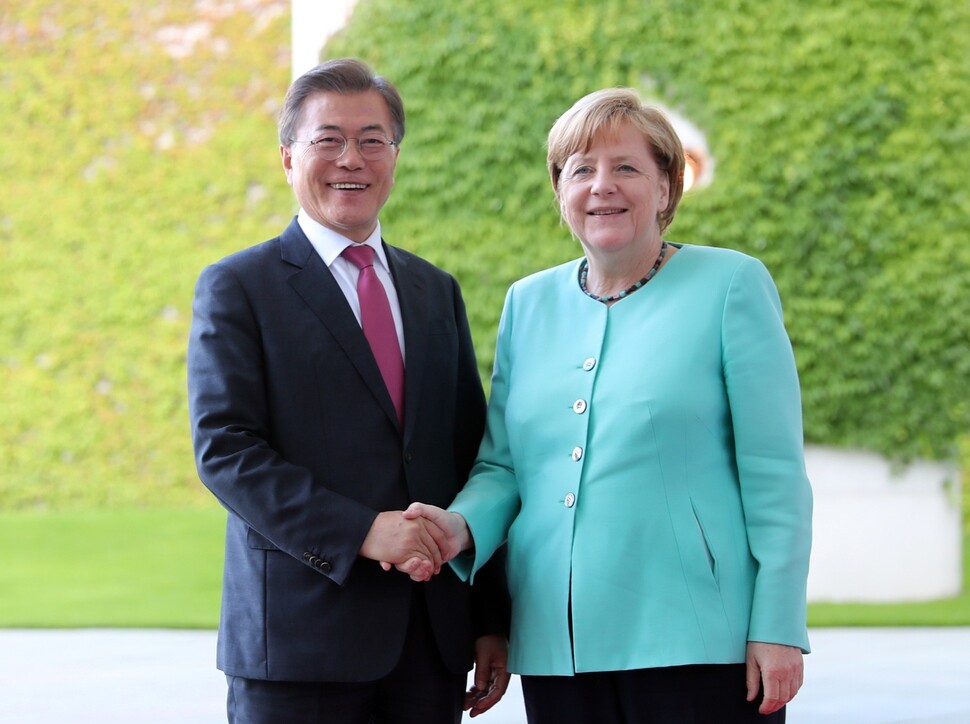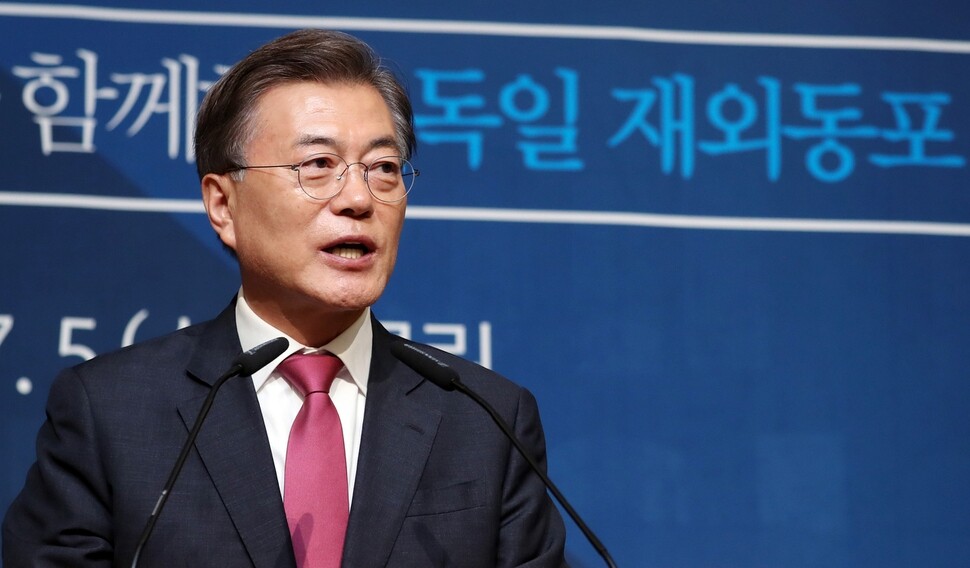hankyoreh
Links to other country sites 다른 나라 사이트 링크
Pres. Moon sticking to pressure and dialogue approach after N. Korea’s ICBM launch

“They’re even firing missiles in North Korea, and the security crisis is more severe than ever before. I have a heavy heart,” said President Moon Jae-in during a meeting with several members of the ruling Minjoo Party and Blue House aides in the VIP room at Seoul Air Base on the morning of July 5, shortly before he left for Germany to attend the G-20 summit. Moon had been planning to take the initiative in policy toward North Korea based on the success of his summit with the US, but his remarks indicate concerns that his plan will be strangled in the cradle by North Korea’s ICBM launch.
At 7 am on the same day, South Korean and US missile units on the coast of the East Sea fired ballistic missiles that could be used to target the North Korean leadership. The exercise followed Moon’s orders to carry out a show of force to respond to North Korea’s ICBM launch the day before. “This is not a situation in which a statement is an adequate response to North Korea’s severe provocation, and we need to clearly show our response posture to the North,” Moon said.
Clearly, this is not an easy situation. One day after the US initially concluded that the Hwasong-14 missile launched by North Korea was an intermediate-range ballistic missile, it reversed its finding. “Focusing on range, it appears to be an early stage of an ICBM,” said Defense Minister Han Min-koo during a report to the National Assembly Defense Committee on July 5. North Korea has argued that over the course of five nuclear tests it has succeeded at making nuclear warheads that are standardized, miniaturized and lightweight. For North Korea to have succeeded at test launching an ICBM, which would provide the means of delivering such a nuclear warhead, could be a game changer that upends the strategic balance in Northeast Asia. When the threat level increases, countermeasures are sure to change as well.

During the South Korea-US summit, Moon suggested that the solution to the North Korean nuclear and missile issue was for the two countries to “employ both sanctions and dialogue in a phased and comprehensive approach.” North Korea’s launch of an ICBM is basically both a rebuttal to Moon’s plan and a blatant challenge to the South Korea-US joint statement that called on the North to “cease its provocative actions and return to sincere and constructive talks.”
On July 5, the Choson Sinbo responded to Seoul’s efforts to play a leading role by arguing that “the South Korean government is in no position to meddle in nuclear matters, but it has the audacity to act as a proxy for the US. The crisis of a nuclear war can be resolved not by the North giving up its nuclear weapons but by the US giving up its policy of hostility toward the North.” The Choson Sinbo is a newspaper published by the General Association of Korean Residents in Japan (Chongryon), serving as an overseas mouthpiece for Pyongyang.
“Until the US’s policy of hostility toward North Korea and its nuclear threat have been fundamentally dealt with, we will not put our nuclear weapons and ballistic missiles on the negotiating table under any circumstances whatsoever,” declared North Korean leader Kim Jong-un while observing the ICBM test launch on the previous day. This undoubtedly creates an awkward situation for Moon, who has aspired to be a catalyst for dialogue between North Korea and the US in order to resolve the North Korean nuclear and missile issues.
While the Americans promise to only pursue denuclearization of the Korean Peninsula through peaceful means, they are gearing up to intensify sanctions once again. “Any country that hosts North Korean guest workers, provides any economic or military benefits, or fails to fully implement UN Security Council resolutions is aiding and abetting a dangerous regime,” warned US Secretary of State Rex Tillerson in a statement released on July 4.
The statement basically appears to serve as a warning that the US will pressure China to strengthen its sanctions against North Korea. Related discussion will take place in the UN Security Council on July 5. Depending on how the situation plays out, this could undermine cooperation between the US and China on sanctions against North Korea, cooperation which has continued since the US-China summit in April. This could be another blow for Moon, who is determined to work on inter-Korean relations “provided that this does not weaken the international community’s framework of sanctions against North Korea.”
Moon is planning to unveil his plan for North Korean policy during a speech he has been invited to deliver in Berlin on the evening of July 6 by the Korber Foundation. “We need to send a message about what direction we will move in when [North Korea] gives up [its nuclear weapons and missiles],” said a senior official at the Blue House. “It’s not possible to open the door to dialogue at the moment, but we believe that eventually that time will come, and we’re going to be prepared for that contingency.” This suggests that Moon will sternly criticize North Korea’s nuclear and missile provocations while maintaining his stance of simultaneously pursuing pressure and dialogue. Even though Moon‘s plan for North Korea faces obstacles, Moon is well aware that the issue cannot be solved through pressure and sanctions alone.
By Jung In-hwan, Choi Hye-jung, Kim Tae-gyu, staff reporters, and Yi Yong-in, Washington correspondent
Please direct questions or comments to [english@hani.co.kr]

Editorial・opinion
![[Column] Park Geun-hye déjà vu in Yoon Suk-yeol [Column] Park Geun-hye déjà vu in Yoon Suk-yeol](https://flexible.img.hani.co.kr/flexible/normal/500/300/imgdb/original/2024/0424/651713945113788.jpg) [Column] Park Geun-hye déjà vu in Yoon Suk-yeol
[Column] Park Geun-hye déjà vu in Yoon Suk-yeol![[Editorial] New weight of N. Korea’s nuclear threats makes dialogue all the more urgent [Editorial] New weight of N. Korea’s nuclear threats makes dialogue all the more urgent](https://flexible.img.hani.co.kr/flexible/normal/500/300/imgdb/original/2024/0424/7317139454662664.jpg) [Editorial] New weight of N. Korea’s nuclear threats makes dialogue all the more urgent
[Editorial] New weight of N. Korea’s nuclear threats makes dialogue all the more urgent- [Guest essay] The real reason Korea’s new right wants to dub Rhee a founding father
- [Column] ‘Choson’: Is it time we start referring to N. Korea in its own terms?
- [Editorial] Japan’s rewriting of history with Korea has gone too far
- [Column] The president’s questionable capacity for dialogue
- [Column] Are chaebol firms just pizza pies for families to divvy up as they please?
- [Column] Has Korea, too, crossed the Rubicon on China?
- [Correspondent’s column] In Japan’s alliance with US, echoes of its past alliances with UK
- [Editorial] Does Yoon think the Korean public is wrong?
Most viewed articles
- 1‘We must say no’: Seoul defense chief on Korean, USFK involvement in hypothetical Taiwan crisis
- 2Will NewJeans end up collateral damage in internal feud at K-pop juggernaut Hybe?
- 3[Column] Park Geun-hye déjà vu in Yoon Suk-yeol
- 4Why Korea shouldn’t welcome Japan’s newly beefed up defense cooperation with US
- 5Thursday to mark start of resignations by senior doctors amid standoff with government
- 6N. Korean hackers breached 10 defense contractors in South for months, police say
- 7[Guest essay] The real reason Korea’s new right wants to dub Rhee a founding father
- 8[Column] ‘Choson’: Is it time we start referring to N. Korea in its own terms?
- 9Kim Jong-un expressed ‘satisfaction’ with nuclear counterstrike drill directed at South
- 10[Editorial] New weight of N. Korea’s nuclear threats makes dialogue all the more urgent